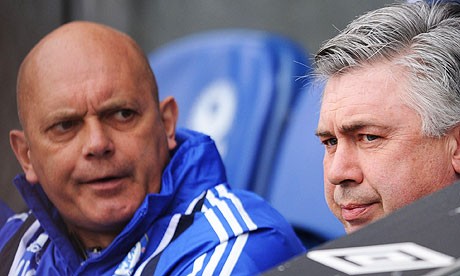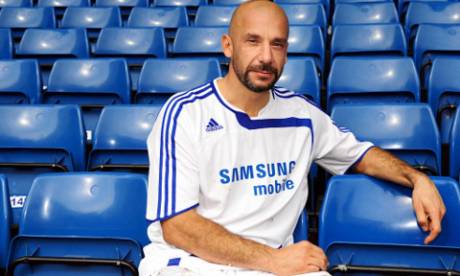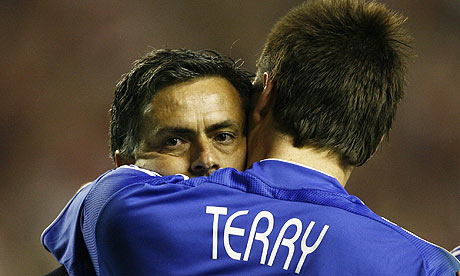As Sunday afternoon slowly leeched away into Sunday evening, Chelsea suddenly found themselves prompted into quickly quashing the growing rumours that a minor dip in his side’s form and a recent, supposedly critical, undermining of his administrative authority had left manager Carlo Ancelotti dallying over his position at the club.
Ten days ago, an apparently unwitting Ancelotti was rendered powerless as erstwhile assistant Ray Wilkins was ruthlessly removed from his staff by the club’s hierarchy and, with the malaise of having to watch his side toil to yet another defeat at the weekend beginning to settle, bookmakers started to report a ‘huge surge’ in betting on the Italian coach’s imminent departure amidst spiralling internet speculation.
Ancelotti himself then fuelled the conjecture by publicly admitting that he wasn’t in ‘total control’ of team affairs at Stamford Bridge after the club’s powerbrokers shunted former scout Michael Emenalo into the void left by Wilkins without seeking their manager’s consent:
“It is different because (Manchester United manager Sir Alex) Ferguson has total control of the team. I have just the technical direction, full stop, okay?
[The Wilkins situation] is not the reason why we lost the games. We lost the games because in four games, we scored just one goal. We have to improve there, to stay more in focus, we have to continue to play like we did against Birmingham.
Obviously criticism can happen when the team don’t win. There is more responsibility on the coach but this is normal. This is my job. If the team is not doing a good job, it is normal to have more responsibility. I don’t have a problem,
Am I prepared for criticism? Yes, I am prepared. This is the life of the coach. This is a difficult moment but I think we are capable of moving on.”
Just before the close of play, Chelsea released a brief statement (via Sky Sports News) in a bid to temper the fevered speculation:
“Ancelotti is contracted until 2012 and speculation about his future is total nonsense.”
All well and good, but it’s worth noting that several well-placed counter-reports also surfaced pertaining that Ancelotti had indeed sought council from the League Managers Association (who are effectively his ‘union’ reps) over what options were available to him regarding his immediate future.

Whereas it would be verging on flagrant sensationalism to suggest that Ancelotti is in the process of tendering his resignation at Chelsea (who, lest we forget, are still sitting at the summit of the Premier League), it’s hard to argue that the developments of the last fortnight or so have once again unearthed the fallibility of the club’s knotted power structure.
According to the ‘high-ranking’ Chelsea source being quoted in this morning’s Guardian, Wilkins was dismissed as a direct result of several first-team players complaining to owner Roman Abramovich of being ‘unconvinced’ by the former assistant manager’s ability – and sadly this kind of ‘cloak and dagger’ dispatching/appointment of staff is far from being an entirely new concept at Stamford Bridge, especially during the Russian oligarch’s ongoing tenure.
Chelsea have a rich history of letting ‘player power’ hold a far-too influential sway when it comes to their board room decisions.

As far back as 2000, manager Gianluca Vialli was sacked as manager just five matches into the new season (and four months after winning the FA Cup) when French defender Frank Leboeuf told the world’s press that many of Chelsea’s first-team players ‘had a few problems’ with the Italian’s particular strain of coaching methods.
Leboeuf was dropped for his insolence but, crucially, Vialli was also ruthlessly denied of the ‘last chance’ he’d been promised to deliver the league title to Stamford Bridge for the first time since 1955.
The manner of Vialli’s dismissal laid down a blueprint which was repeated ad infinitum during the next decade of Chelsea’s history, a decade that has included both unparalleled success and seemingly unbridled managerial upheaval.

When Abramovich bought into the club in 2003, he quickly sought to bring in his own man at the helm and replaced Claudio Ranieri with Jose Mourinho a year later.
The Portuguese egotist was the perfect fit for the Russian billionaire’s burgeoning global marketing enterprise and all seemed symbiotically rosy until Abramovich and his close circle of ‘yes men’ got ideas above their station and started meddling in first-team affairs.
In potted terms, it all came to head in 2007 and Mourinho walked after a Champions League tie with Rosenborg, leaving in his wake a formidable legacy and a newly devout band of smitten followers within the Chelsea squad – players he still, three years down the line, describes as ‘belonging to him’.
All but one (Ancelotti, as yet) of Mourinho’s permanent successors have outwardly seen their fate dictated by Chelsea’s ‘old guard’, indeed Phil Soclari (July ’08 – September ’09) directly cited the influence that ‘problem players’ Didier Drogba, Michael Ballack and Petr Cech had on their supposed superiors for the manner in which he received his premature marching orders – with the chummy alliance between John Terry, Frank Lampard and Abramovich being blamed for Avram Grant‘s untimely departure the year before.
The relatively rapid turnover of the club’s managers, combined with the hovering spectre of the need for instant success has undoubtedly allowed certain senior players (being the only constant during a sustained period of flux) to ascend to prominent positions of influence.
Terry, Lampard, Drogba and a few other selected remnants of the Mourinho-coddled ‘boy’s club’ appear to have forged a direct line to the owner over the past few years – a line of communication that often bypasses, and therefore completely undermines the control of, the club’s supposed figurehead, i.e. their manager.
It is ultimately telling that both Manchester United and Arsenal, where a single patriarchal figure is allowed to reign supreme over the team’s fortunes, haven’t experienced managerial turbulence (or even speculation on the subject – bar Fergie’s retirement) in any magnitude even approaching the levels that Chelsea seem perfectly willing to allow to perpetuate.
Add Sportslens to your Google News Feed!